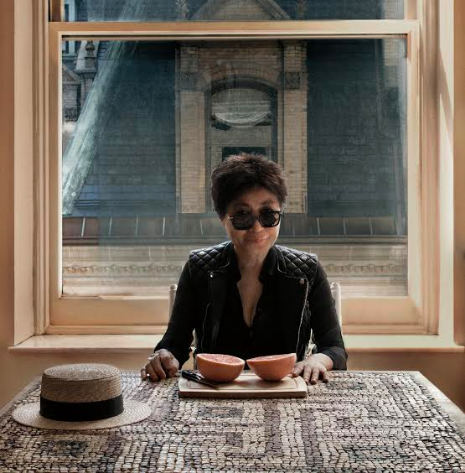Reflections: Yoko Ono

The original avant-garde muckraker takes on the Trump era with a barebones selection of reimagined protest anthems.
“It’s just so sad that John is not here now because he would have put all his energy into making people understand,” Yoko Ono says on a fall day, just before the Midterm Elections, during one the darkest, most divisive periods in modern American political history. “It’s time for action.”
Ono is talking about her late husband John Lennon, of course, whose message and music have continued to guide her career 38 years after his tragic murder outside their New York apartment building, the Dakota. In October, Ono released her first proper LP in five years, Warzone, which revisits 13 songs that the now-85-year-old singer originally recorded during the post-Beatles era between 1970–2009. The tracks are stripped down, focusing on her voice and lyrics, creating an overall haunting arrangement that’s fitting in the Trump era. “I didn’t think that I was doing it to put emphasis on my voice, but the voice is giving the message, so that was a good thing I did without knowing it,” Ono says.
As the album’s loaded title suggests, the refreshed numbers—which range from classic sing-alongs like “Imagine” to material originally tracked during Ono’s more experimental sojourns into proto-punk, new wave and gallery-rock—were carefully curated, reflecting a mix of “somber warnings” and a sense of “uplifting encouragement.” Though written during varied times of cultural unrest, Ono sees a common thread throughout the record. “I went by my feelings. Each song had a very definite message, and that’s what I went for,” she says. “Songs like ‘I Love You Earth,’ ‘I Love All of Me,’ ‘It’s Gonna Rain’—I definitely had it in my mind that those songs would [touch on] what’s happening now.”
Since moving to the city in 1953, Ono has aged into a New York artist on par with David Byrne and David Bowie, sometimes fading into her urban backdrop, other times emerging when she hears the right rallying call. It is comforting to know that she is part of the city’s cultural framework. This past September, she reunited with Ringo Starr to stage a “bed- in”—a nod to her and Lennon’s famed 1969 protest—with the help of Jeff Bridges, New York City Mayor Bill de Blasio and others to support public schools as part of The John Lennon Educational Tour Bus campaign.
In certain ways, Ono has also grown into the matriarch of an art-rock world that she anticipated at the height of the psychedelic era. Critics described her early work as uneven and out-of-tune, but her flair for dissonant, noisy improvisation and avant-garde experimentation may have simply come a few decades too early. And, today, her music sits in a comfortable place between the DIY garage-improv scene and more polished indie purveyors who draw a direct line to The Beatles. “I don’t think about who caught up with who on what,” she says of her status. “I just keep rolling, that’s all.”
Especially through her son Sean, but also on her own, she’s become a godmother to a new generation of alternative- minded outside musicians, collaborating with The Flaming Lips, Mark Ronson, Tune-Yards, Jack Antonoff, Questlove and the musical couple Yuka C Honda and Nels Cline, who lived in an apartment at Sean’s Greenwich Village brownstone for a while. She even popped up at the intimate New York club Irving Plaza two years ago to join The Claypool-Lennon Delirium for the Primus classic “Southbound Pachyderm” and revived the Plastic Ono Band name for a few releases this decade. Her reasons were simple: “I wanted to use the name Plastic Ono Band because it made me feel like John was on the side of me.”
Warzone, which came out through Sean Lennon’s Chimera Music, features contributions from a number of modern voices, including composer Nico Muhly, veteran downtown guitarist Marc Ribot, cellist Erik Friedlander and keyboardist Thomas Bartlett, best known in the indie-rock world as Doveman. (It also weaves in a variety of pet sounds, ranging from baboons to monkeys to elephants.) Like most of Ono’s recent work, Sean helped point her in the right direction. “The Republican wave was getting stronger and stronger and I thought, at one point, maybe I should save myself and not put out this record,” she says. “And sure enough, I got a call from Sean and he said, ‘You have to put out this record.’ We both knew what that meant, and I’m very happy that I did not stop the record from coming out.”
Despite changing tide in the Brooklyn and Lower East Side underground music communities that have pushed many emerging acts out of the city, Ono says that “anybody who comes into the scene now are very lucky people.” She’s also ventured into the electronic music space—a string of her oft-overlooked catalog cuts have been remixed into dance hits in recent years and, on 2016’s Yes, I’m a Witch Too, Moby, Death Cab for Cutie, Portugal. The Man and Peter Bjorn and John offered unique spins on her work. “I think dance music is not respected so much, and I wanted to make a go at it,” she says.
But, at this stage in her career, her bucket list has mostly been checked off. When asked if there is a stage she has still yet to play, she says, “No, because I always like to make music in places that I’m used to.” However, a few things have eluded Ono in her career—she regrets not being able to work more with Frank Zappa, who famously invited her and Lennon onstage at New York’s Fillmore East in 1971. “I thought we would go on performing a few things but, sadly, he passed away. He was one of the greatest musicians.”
This article originally appears in the December 2018 issue of Relix. For more features, interviews, album reviews and more, subscribe here.



















